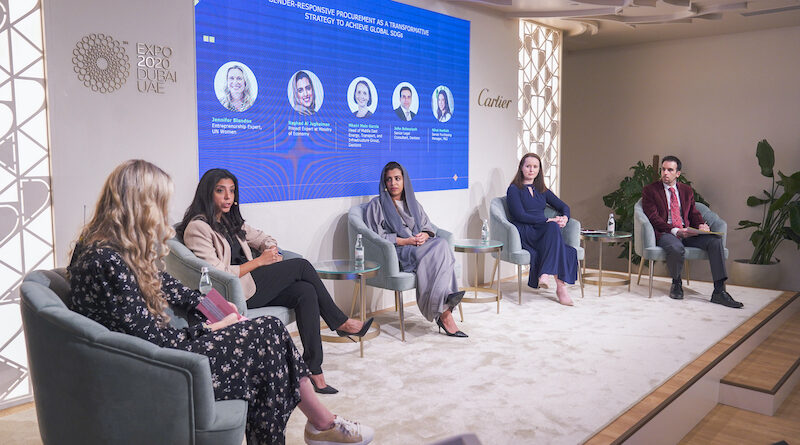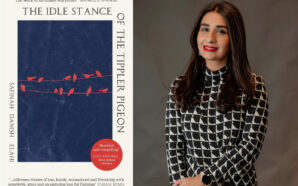-
E. Reem BinKaram: “For many women, entrepreneurship offers a path to economic empowerment.”
-
E. Faisal Al Hammadi: “When women thrive, humanity thrives.”
-
Mouza Al Shehhi: “Procurement connects us all, so our relationships matter.”
January 20th, 2022 (Sharjah, UAE): The skills, resources, and opportunities provided by UAE-based NAMA Women Advancement and UN Women have empowered more than 340,000 women around the world to participate equally in markets and support economic growth overall. This was revealed at a panel discussion held at the Women’s Pavilion at Expo 2020 Dubai, which spotlighted the transformative potential of gender-responsive procurement and its role as a strategic lever in enabling women entrepreneurs to build a better world.
At the session hosted jointly by NAMA and UN Women as part of the Global Goals Week at Expo 2020 Dubai, discussions centred on creating better outcomes for women and enhancing national economies by advancing reform and action through the prism of gender-sensitive policies.
The session titled, ‘Gender-responsive procurement as a transformative strategy to achieve the Sustainable Development Goals’, highlighted the successful practices in different parts of the world including South Africa and the UAE. Panelists discussed how gender-responsive procurement (GRP) is a critical conduit to deliver directly on most SDGs, specifically goals 5, 8 and 12.
Prominent dignitaries at the event included H. E. Faisal Al Hammadi, Assistant Undersecretary for Entrepreneurship and SMEs, UAE Ministry of Economy; Dr. Mouza Al Shehhi, Director, UN Women – UAE Liaison Office for the GCC; Raghad Aljughaiman, Project Expert – Office of Minister of State for Entrepreneurship and SMEs at Ministry of Economy, UAE; Mhairi Main Garcia, Head of Middle East Energy, Transport and Infrastructure Group, Dentons; John Balouziyeh, Senior Legal Consultant, Dentons; and Nihal Hashish, Senior Purchasing Manager, P&G.
GRP: Path to economic empowerment
In a statement issued following the event, H.E. Reem BinKaram, Director, NAMA, reaffirmed NAMA’s firm commitment to building an ecosystem for women’s economic empowerment. The NAMA Director called on public and private sector stakeholders to apply actionable solutions unveiled at the session to make informed procurement decisions to promote inclusive supply chains and contribute to the SDGs.
The Director of NAMA said: “For many women, entrepreneurship offers a path to economic empowerment. We need firm commitments from all stakeholders to build partnerships, make our ambitions a reality and further enable women entrepreneurs.”
“Procurement connects us all, so our relationships matter,” said Dr. Mouza Al Shehhi, Director of UN Women-UAE Liaison Office for the GCC, in her welcome address. She detailed how the partnership with NAMA to support women-owned business inclusion in supply chains has benefited more than 2,500 women entrepreneurs in the UAE through structured training and mentoring sessions that equipped them with the knowledge and tools to enhance their access to procurement opportunities.
Inclusive, sustainable policies in the UAE
In his keynote address, H. E. Faisal Al Hammadi, Assistant Undersecretary for Entrepreneurship and SMEs, UAE Ministry of Economy, emphasised that the UAE’s ranking as a leading country in gender equality in the region stems from the vision of its founding leaders who believe in the equal partnership of men and women to create a more inclusive, sustainable, and prosperous nation.
A series of government-led initiatives, such as the National SME Programme – where one-third of members are female; and the recently launched Entrepreneurial Nation initiative, are enabling women entrepreneurs in both innovative and traditional sectors to set up and expand businesses in the UAE and across its boundaries, he said.
 Al Hammadi added that the UAE’s commitment to supporting the development and progress of women in all sectors saw a record of 23 Emirati women making the cut on Forbes‘ 100 Most Powerful Arab Businesswomen list in 2020. “The launch of a Women’s Pavilion for the first time in a world expo is also an example of our belief that when women thrive, humanity thrives.”
Al Hammadi added that the UAE’s commitment to supporting the development and progress of women in all sectors saw a record of 23 Emirati women making the cut on Forbes‘ 100 Most Powerful Arab Businesswomen list in 2020. “The launch of a Women’s Pavilion for the first time in a world expo is also an example of our belief that when women thrive, humanity thrives.”
In a virtual presentation, Professor Olive Shisana, Special advisor to the President of South Africa and Chair of the National Task Team on Preferential Procurement, unveiled lessons from the South African experience, most notably the country’s National Strategic Plan on Gender-Based Violence and Femicide (GBVF) and the Women Economic Assembly (WECONA).
She said: “A key pillar of the National Strategic Plan identifies economic power as a critical lever to women’s economic equality and challenges public sector institutions to develop and implement mechanisms to fast-track procurement from women-owned businesses. The Women Economic Assembly (WECONA) also emphasises the participation of women-owned enterprises on the entire value chain to foster sustainable economic development.”
Calling for more holistic, integrated models that respond to the realities of women and remove the structural barriers, she added: “Gender-responsive procurement facilitation should be the aim of all national initiatives to support women.”
Need for greater gender perspective on procurement systems
Outlining the promise of GRP in shaping positive opportunities and outcomes for women, Jade Cochran, Programme manager for UN Women’s Stimulating Equal Opportunities flagship programme, said: “Thanks to NAMA’s support for the Flagship Programme, we are on our way to directly empowering 20,000 women in South Africa and UAE through their participation in the economy. NAMA’s support on the global level through policy advice, technical support and data, evidence and knowledge, has enabled more than 340,000 women increase their participation in the economy.”
NAMA’s support for the Flagship Programme has also enabled 50 organisations in developing and improving their GRP practice in UAE and South Africa, she added. “Globally, NAMA’s partnership has contributed to UN Women supporting 536 government companies and international organisations in implementing GRP policies and practices.”
Discussing the emerging trends in GRP in the public and private sectors, Raghad Aljughaiman, Project Expert – Office of Minister of State for Entrepreneurship and SMEs at Ministry of Economy, UAE, said that 30% of female-owned businesses in the UAE generate USD 100,000 annually. “At the federal level, 5% of government procurement is reserved for UAE-based entities, which increases to 10% at the state level. Yet, a lack of awareness and lack of information or training in processing these requirements are barriers currently preventing women business owners from availing of these opportunities.”
She added: “These gaps are being addressed through a series of training sessions under the National SME Programme which now sees a 30% participation by women-owned businesses.”
 Mhairi Main Garcia, Head of Middle East Energy, Transport and Infrastructure Group, Dentons, said: “The energy sector is traditionally male-dominated, and huge strides must be made both in women’s workforce participation and gender-responsive procurement policies in this sector. The emerging sectors of renewable energy and cleantech also have immense potential to include women-owned businesses in procurement programmes, but currently, this is not being realised.”
Mhairi Main Garcia, Head of Middle East Energy, Transport and Infrastructure Group, Dentons, said: “The energy sector is traditionally male-dominated, and huge strides must be made both in women’s workforce participation and gender-responsive procurement policies in this sector. The emerging sectors of renewable energy and cleantech also have immense potential to include women-owned businesses in procurement programmes, but currently, this is not being realised.”
John Balouziyeh, Senior Legal Consultant, Dentons, called on all men to be steadfast partners in advancing women not only through gender-responsive procurement but more globally, in all aspects of economic participation and human rights. He said: “It wouldn’t be possible to achieve the SDGs unless women’s economic participation is promoted, and women’s rights are protected.”
Nihal Hashish, Senior Purchasing Manager at P&G, said: “At P&G, our end game is to be a change agent and step up as a force for good in the communities we operate in. In fact, we surpassed the global average percentage of 4% and are currently sourcing 7% of total spend from women-owned businesses. We hope that as we engage in more initiatives and transparent public discourse, more organisations and businesses will embrace gender inclusivity and diversity in their operations.”
Following the conclusion of the panel discussion, the UN Women UAE Liaison Office held an innovative, practical workshop for procurement professionals to outline strategies for implementing gender-responsive procurement in their organisations to equip them with best practices and tools to make impactful changes. The workshop underscored the importance of GRP, delved into the strategies that work and discussed how to embed GRP throughout an organisation and use data to track progress.











